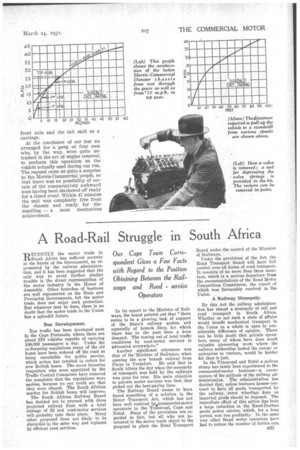A Road-Rail Struggle in South Africa R ECENTLY the motor trade
Page 53

If you've noticed an error in this article please click here to report it so we can fix it.
in South Africa has suffered severely' at the hands of the Government, as represented by the railway administra'lion, and it has been suggested that the only way to avoid further similar trouble is the direct representation of • the motor industry in the House of Assembly. Other branches of business ,are well represented on theState and Provincial Governments, bit the motor trade does not enjoy such protection. But whatever may be done, there is no doubt that the motor trade in the Union has a splendid future.
Bus Development.
Bus traffic has been developed most In the Cape Peninsula, where there are about 270 vehicles capable of carrying 100,000 passengers a day. Under the re-licensing regulations many of the old buses have been ordered off the road as being unsuitable for public service, which action has resulted in orders for new British buses. The seven licensing inspectors who were appointed by the Traffic Control Committee have removed the complaint that the regulations were useless, because no one could see that they were obeyed. The South African market for British buses will improve.
The South African Railway Board has decided not to proceed with three projected railway lines with a total mileage of 62 and road-motor services will-probably take their place. Many other proposed lines are likely to , be discarded in the seine way and replaced by efficient road services. In its -report to the Minister of Railways, the board pointed out that " there seems to be a growing lack of support of the State's railway system and especially of branch lines, for whieh there has in the past been a keen demand. The testing out of local traffic conditions by road-motor services is advocated everywhere."
Another significant utterance was that of theMinister of Railways, when opening the new branch railway from Parys to Vredefort. He said that in South Africa the day when the monopoly of transport was held by the railways was gone for ever. His main objection to private motor services was that they picked out the best-paying lines
The Railway Board seems to have found something of a solution in the Motor -Transport Act, which has not been well received byecompiercial-motor operators in the Transvaal, Cape and Natal. Many of the provisions are regarded as fair, but all who are interested in the motor trade object to the proposal to place the Road Transport
• Board, under the control of the Minister of Railways..
Under the provisions of the Act, the Road Transport Board will have full control over, all forms of road transport. It consists of no more than three members, which is a serious departure from the recommendations of the Road Motor Competition Commission, the report of which was favourably received in the Union.
A Railway Monopoly.
By this Act the railway administration has almost a monopoly of rail and road transport in South Africa. Whether or not such a state of affairs would benefit mechanical transport in the Union as a whole is open to considerable difference of opinion. There can be little doubt that private operators, many of whom have done much valuable pioneering work where the railway authorities lacked the energy or enterprise to venture, would be harder hit than is just.
In the Transvaal and Natal a serious slump has lately been experienced in the commercial-motor business—a consequence of the attitude of the railway administration. The administration has decided that, unless business 'houses contract-to have all goods transported by the railway, extra wharfage dues on imported goods should be imposed. The immediate effect of this action has been a large reduction in the Rand-Durban goods motor service, which, for a long Period, was run profitably. In the same way other Rend motor operators have had to reduce the number of lorries run.




































































































